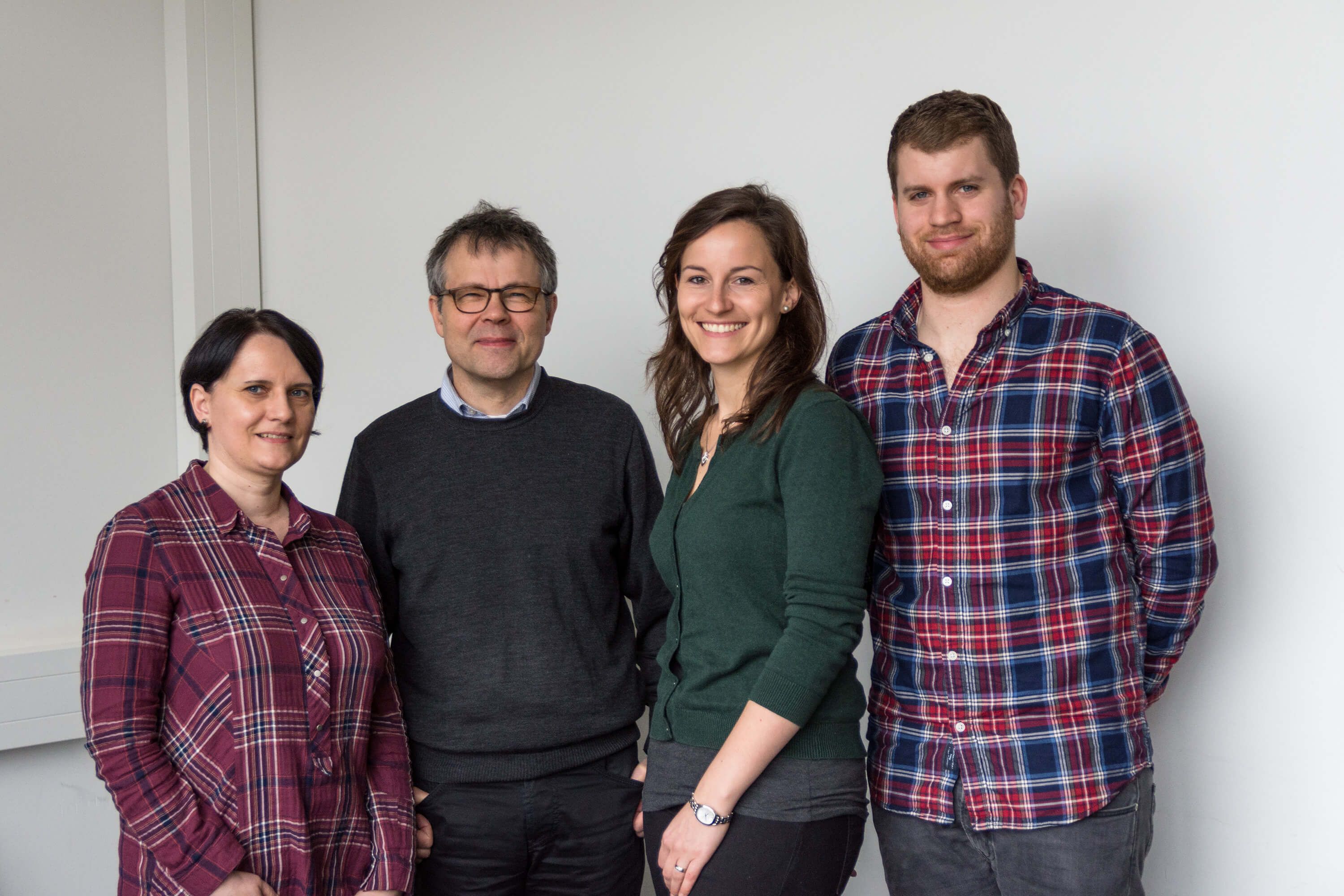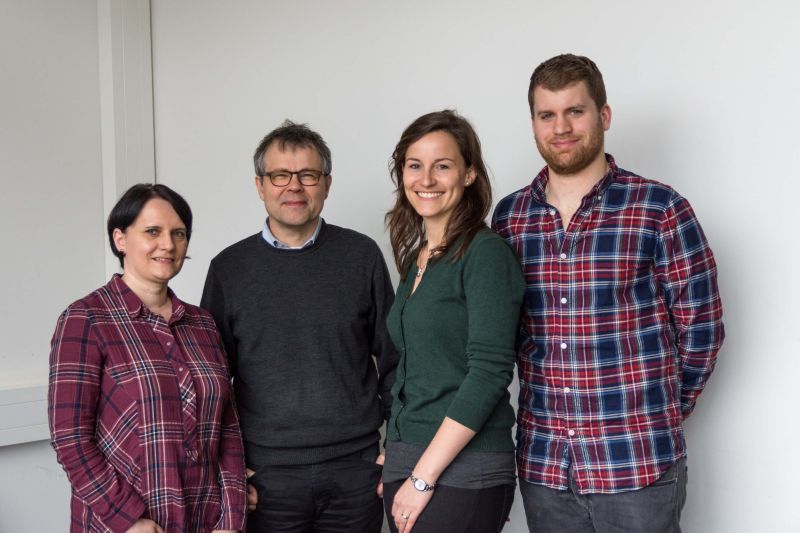SFB 1192
Project A4
Tissue resident memory T cells in glomerulonephritis
CD4+ T cells are central for the development of crescentic glomerulonephritis (GN). During GN, T cells are recruited to the kidney, however, the course and severity of GN might also be influenced by the pre-existing T cells resident in the kidney. In a mouse model of Staphylococcus aureus infection, we observe an extensive bacterial infection of the kidney which causes a profound renal accumulation of TH17 cells. After the clearance of infection, elevated amounts of T cells remain in the kidney and acquire a tissue resident memory T cell (TRM cell) phenotype. Induction of GN in this mouse model, after the mice recovered from infection, leads to aggravated renal disease and preliminary results indicate a reactivation of kidney resident TH17 cells previously generated during the Staphylococcus aureus infection. On the basis of these observations, we hypothesize that a renal infection causes persistent changes in TRM-cell composition in the kidney. During GN, infection-induced renal TRM cells are reactivated by inflammatory signals and alter course and severity of GN. In this project, we will focus on the characteristics and function of renal TRM cells in infection and autoimmunity. We will combine mouse infection models with models for GN to analyze the response of renal TRM cells in vivo. In parallel, the function of resident T cell populations will be investigated in human kidney biopsies. Main topics will be: i) phenotype, function, and transcriptomic profile of resident renal T cells; ii) signals that lead to reactivation of renal T cells; and iii) mechanisms by which resident T cells cause aggravated GN. In conclusion, this study will increase our knowledge on the contribution of T cells to GN and will help to identify processes that can be therapeutically targeted.
Publications
-
Kidney-resident innate-like memory γδ T cells control chronic Staphylococcus aureus infection of mice
Bertram T, Reimers D, Lory NC, Schmidt C, Schmid J, C Heinig L, Bradtke P, Rattay G, Zielinski S, Hellmig M, Bartsch P, Rohde H, Nuñez S, Rosemblatt MV, Bono MR, Gagliani N, Sandrock I, Panzer U, Krebs CF, Meyer-Schwesinger C, Prinz I, Mittrücker HWProc Natl Acad Sci U S A. 2023 Jan
-
Tissue-resident memory T cells in the kidney
Asada N, Ginsberg P, Gagliani N, Mittrücker HW, Panzer U.Semin Immunopathol. 2022 Nov
-
Th17 cell plasticity towards a T-bet-dependent Th1 phenotype is required for bacterial control in Staphylococcus aureus infection.
Bartsch P, Kilian C, Hellmig M, Paust HJ, Borchers A, Sivayoganathan V, Enk L, Zhao Y, Shaikh N, Büttner H, Wong MN, Puelles VG, Wiech T, Flavell R, Huber TB, Turner JE, Bonn S, Huber H, Gagliani N, Mittrücker HW, Rohde H, Panzer U, Krebs CF.PLoS Pathog. 2022 Apr
-
IL-17 Receptor C Signaling Controls CD4+ TH17 Immune Responses and Tissue Injury in Immune-Mediated Kidney Diseases.
Schmidt T, Luebbe J, Kilian C, Riedel JH, Hiekmann S, Asada N, Ginsberg P, Robben L, Song N, Kaffke A, Peters A, Borchers A, Flavell RA, Gagliani N, Pelzcar P, Huber S, Huber TB, Turner JE, Paust HJ, Krebs CF, Panzer U.J Am Soc Nephrol. 2021 Dec
-
Neutralization of IL-6 inhibits formation of autoreactive TH17 cells but does not prevent loss of renal function in experimental autoimmune glomerulonephritis.
Brede KM, Schmid J, Steinmetz OM, Panzer U, Klinge S, Mittrücker HW.Immuno Lett. 2021 Aug
-
Clonal expansion and activation of tissue-resident memory-like Th17 cells expressing GM-CSF in the lungs of severe COVID-19 patients.
Yu Zhao, Christoph Kilian, Jan-Eric Turner, Lidia Bosurgi, Kevin Roedl, Patricia Bartsch, Ann-Christin Gnirck, Filippo Cortesi, Christoph Schultheiß, Malte Hellmig, Leon U B Enk, Fabian Hausmann, Alina Borchers , Milagros N Wong, Hans-Joachim Paust , Francesco Siracusa, Nicola Scheibel, Marissa Herrmann, Elisa Rosati, Petra Bacher , Dominik Kylies, Dominik Jarczak, Marc Lütgehetmann, Susanne Pfefferle, Stefan Steurer, Julian Schulze Zur-Wiesch, Victor G Puelles, Jan-Peter Sperhake, Marylyn M Addo, Ansgar W Lohse, Mascha Binder, Samuel Huber, Tobias B Huber, Stefan Kluge, Stefan Bonn, Ulf Panzer , Nicola Gagliani, Christian F Krebs.Sci Immunol. 2021 Feb
-
Rituximab Induces Complete Remission of Proteinuria in a Patient With Minimal Change Disease and No Detectable B Cells
Webendörfer M, Reinhard L, Stahl RAK, Wiech T, Mittrücker HW, Harendza S, Hoxha E.Front Immunol. 2021 Feb
-
Pathogen-induced tissue-resident memory TH17 (TRM17) cells amplify autoimmune kidney disease.
Krebs CF, Reimers D, Zhao Y, Paust HJ, Bartsch P, Nuñez S, Rosemblatt MV, Hellmig M, Kilian C, Borchers A, Enk LUB, Zinke M, Becker M, Schmid J, Klinge S, Wong MN, Puelles VG, Schmidt C, Bertram T, Stumpf N, Hoxha E, Meyer-Schwesinger C, Lindenmeyer MT, Cohen CD, Rink M, Kurts C, Franzenburg S, Koch-Nolte F, Turner JE, Riedel JH, Huber S, Gagliani N, Huber TB, Wiech T, Rohde H, Bono MR, Bonn S, Panzer U, Mittrücker HW.Sci Immunol. 2020 Aug
-
Effector TH17 Cells Give Rise to Long-Lived TRM Cells that Are Essential for an Immediate Response against Bacterial Infection.
Maria Carolina Amezcua Vesely , Paris Pallis, Piotr Bielecki , Jun Siong Low, Jun Zhao, Christian C D Harman, Lina Kroehling, Ruaidhrí Jackson, Will Bailis, Paula Licona-Limón, Hao Xu, Norifumi Iijima, Padmini S Pillai, Daniel H Kaplan, Casey T Weaver, Yuval Kluger, Monika S Kowalczyk, Akiko Iwasaki, Joao P Pereira, Enric Esplugues, Nicola Gagliani, Richard A Flavell Cell. 2019 Aug
Project-Team
Project Leader
Prof. Dr. Hans-Willi Mittrücker
Prof. Dr. Nicola Gagliani
Co-Workers
Karen Brede
Joanna Schmid



